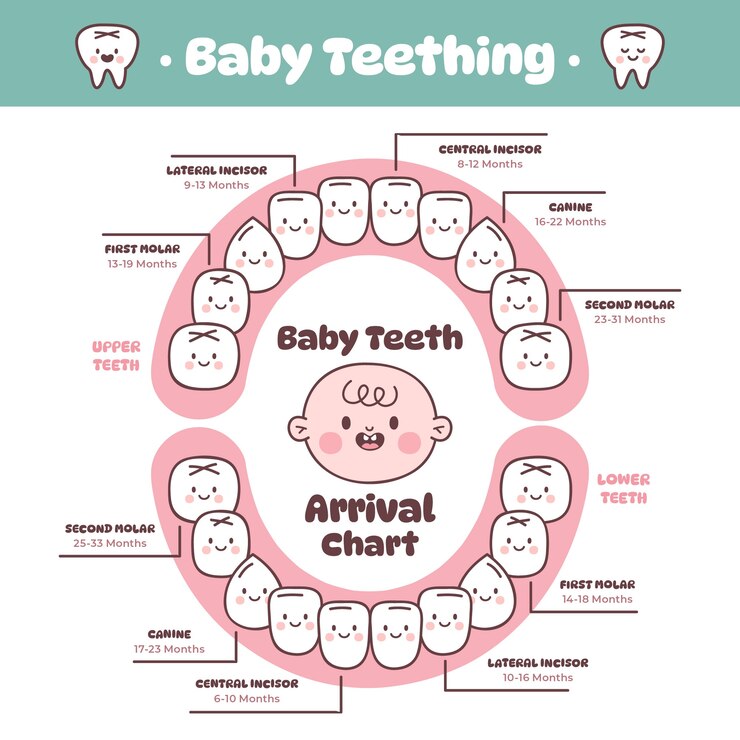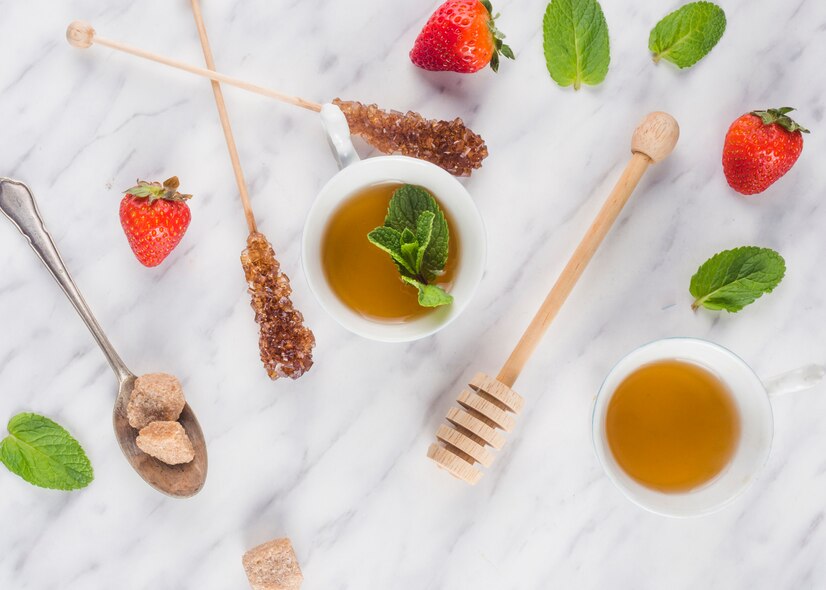Natural remedies for teething are easy and available in every home, All mothers can easily use them.
We will learn about them, but first, let us know more about teething and its symptoms then discuss natural remedies for teething.
When does teething start in babies and how long does it last?
Teething refers to the process by which a baby's primary teeth emerge through the gums.
You should know that there is a wide range of when typical teething starts There is no need to worry if your child is late in teething or has early teeth.
However, it is most common for children to start teething at six months.
However, it can begin as early as 4 months or as late as 12 months for some infants.
By the age of three, the child will have a full set of 20 primary teeth After that, the primary 3 will gradually begin to fall out to make way for permanent teeth, starting around age 6.
But if your child hasn’t appeared a tooth by the time he is 18 months old, talk with your dentist.

What are the types of teeth that appear in a child and the order in which they appear?
Natural remedies for teething are available and easy to use but you should know the types of teeth and sequences of their appearance to know which one causes more pain than the other to know how to use natural remedies for teething
Here’s the typical order of appearance for the types of teeth during teething:
Central Incisors
- Emerge: 6-12 months
- Location: Front of the mouth (two on top, two on bottom)
Lateral Incisors
- Emerge: 9-16 months
- Location: Next to the central incisors (two on top, two on bottom)
Canines (Cuspids)
- Emerge: 16-23 months
- Location: Next to the lateral incisors (two on top, two on bottom)
First Molars
- Emerge: 13-19 months (top) and 14-18 months (bottom)
- Location: Behind the canines (two on top, two on bottom)
Second Molars
- Emerge: 25-33 months
- Location: At the back of the mouth (two on top, two on bottom)
You should know that This sequence can vary from child to child, but this is the most common pattern for the appearance of primary teeth.
What are the teething symptoms that, if they appear in your child, will indicate that you need to use Natural remedies for teething?
Babies in the teething period may show some illness and discomfort this period is not easy for babies and even for parents.
You should take care of your baby if it shows some illness but there is no medical reason for that it may associated with teething we will discuss now symptoms associated with teething Which requires the use of natural remedies for teething.
Gum Sensitivity
Swollen, tender, or red gums where teeth are emerging.
Increased Drooling
Excessive saliva production, leading to drooling.
Irritability
Babies may be more irritable or fussy due to discomfort.
Chewing or Biting
A strong urge to chew on objects or fingers for relief.
Sleep Disturbances
Difficulty sleeping or more frequent waking at night.
Loss of Appetite
Decreased interest in feeding, especially if sucking causes discomfort.
Rash
A mild rash around the mouth or chin due to drooling.
Ear Pulling or Rubbing
Babies may pull at their ears or rub their faces as a response to discomfort.
If these symptoms appear in your baby this means he is about to teethe and you can use natural remedies for teething.
What are the types of remedies you can use to soothe your baby's pain?
Remedies for Teething are divided into two types natural remedies for teething and medical type
Natural remedies for teething
- Cold Compress
- Frozen Fruit
- Chilled Foods
- Natural Teething Biscuits
- Essential Oils
- Breastfeeding
- Massage
- Teething Toys
Medical types
- Acetaminophen
- Ibuprofen
- Teething Gels
- Teething Tablets

Natural remedies for teething
Most parents prefer natural remedies for teething to help soothe their baby's pain, over medical solutions.
By exploring these remedies, parents can provide relief in a safe and nurturing way, giving a sense of well-being during this important developmental stage.
Cold Compress
The cold temperature one of the most important natural remedies for teething can help reduce swelling in the gums and can also provide temporary relief from pain and discomfort associated with teething, The cool sensation can also be soothing for fussy babies.
How to use a cold compress:
-
Cold washcloth
Soak a clean washcloth in water, wring it out, and place it in the freezer for about 30 minutes. Give the washcloth to your baby to chew on. It should be cool, but not too cold to cause discomfort.
-
Soft cold packs
A soft cold pack, wrap it in a thin cloth, and gently apply it to the outside of the mouth. Ensure it’s not too cold, and only apply for short periods to avoid discomfort.
Frozen fruits
Frozen fruits are one of the great natural remedies for teething as acold temperature can numb sore gums and relieve pain.
Plus Frozen fruits are nutritious, offering vitamins and minerals while your baby explores new flavors.
Also Chewing on something flavorful can help distract your baby from teething.
Some examples of how to use fruits as one of the natural remedies for teething:
-
Bananas
Easy to freeze and soften as your baby chews. You can freeze banana slices or whole bananas.
-
Peaches
Slice and freeze for a sweet, soft texture when eaten
-
Mango
Cut into small pieces and freeze. The texture is pleasing for babies.
-
Blueberries
Can be frozen, but they should be given with caution to avoid choking.
-
Pears
Slice and freeze for a juicy, soft treat
Chilled food
Chilled foods can be one of the effective natural remedies for teething
The cold temperature can help numb sore gums, and providing temporary Chilled foods can offer essential vitamins and nutrients as your baby explores new tastes.
-
Yogurt
Unsweetened yogurt can be chilled and is easy for babies to eat. You can add pureed fruit for flavor
-
Fruit Purees
Puree fruits like apples, bananas, or peaches and refrigerate them. They can be served cold or slightly chilled.
-
Chilled Smoothies
Blend fruits with yogurt or milk and serve as a cold smoothie. Keep it thick to minimize spills.
-
Soft Cooked Vegetables
Cool soft, steamed vegetables like carrots or sweet potatoes to a safe temperature for your baby to gnaw on
Natural Teething Biscuits
Natural teething biscuits are one of most easiest natural remedies for teething and easy to make and can provide comfort to your baby during teething.
Just be mindful of your baby's chewing abilities and enjoy this delicious homemade snack!
Ensure the biscuits are hard enough for your baby to gnaw on but soft enough to avoid breaking into small pieces that could pose a choking hazard.
Look for natural options without added sugars or artificial ingredients.
You can combine the use of teething biscuits with other types of natural remedies for teething like cold compresses or chilled fruits for additional comfort.
Essential oils
Essential oils can sometimes be one of the important natural remedies for teething their decrease discomfort, but it's important to approach this method with caution.
Common Essential Oils for Teething
-
Chamomile oil
Calming and soothing, it can help alleviate anxiety
-
Clove oil
They are traditionally used for dental pain due to its analgesic properties. Use it sparingly and always diluted.
-
Lavender oil
Known for its relaxing properties, it may help ease irritability and promote sleep.
-
Peppermint Oil
It is one of the most effective natural remedies for teething relief due to its soothing and cooling properties.
-
Frankincense Oil
It has anti-inflammatory properties that may help with swelling and discomfort.
Tips for Safe Use:
Always dilute essential oils with a carrier oil (like coconut or almond oil) before applying to the skin.
You can apply a small amount of the diluted oil to your finger and gently massage it onto your child's gums.
Consider using a diffuser or applying diluted oil to a cloth for your child to hold, instead of applying it directly.
Breastfeeding
Breastfeeding is one of the most important natural remedies for feeding as it has a lot of properties:
- Soothing Effect
The act of breastfeeding can help calm a fussy baby. The closeness and warmth can be very comforting during this uncomfortable time.
- Natural Pain Relief
Breast milk contains antibodies and nutrients that can help boost your baby's immune system and provide some relief from inflammation.
- Gentle Pressure
Sucking can provide gentle pressure on the gums, which may help alleviate some of the discomfort associated with teething.
- Distraction
Breastfeeding can serve as a distraction from the pain, helping the baby feel secure and relaxed.
Massage
Massage is one of the great ways of natural remedies for teething to help soothe pain.
Use a clean finger to gently rub the gums where the teeth are emerging. Apply light pressure to help relieve discomfort.
Or move your finger in small circular motions over the gums to provide additional relief.
Ensure your hands are clean before massaging!
Keep the sessions short and gentle to avoid overwhelming your baby.
Teething Toys
Teething toys can be very helpful in providing relief for babies during the teething process.
Types of teething toys:
- Rubber Teething Rings
These are soft and easy for babies to hold. They can be chilled in the refrigerator for added relief.
- Silicone Teething Toys
Made from food-grade silicone, these are safe and durable. They often come in fun shapes and textures to engage babies.
- Wooden Teething Toys
Natural wood toys can be safe and enjoyable for babies to chew on. Look for untreated wood and ensure they’re sanded smooth.
- Chilled Teething Toys
Toys that can be cooled in the fridge provide a soothing sensation on sore gums.
Ensure toys are made from BPA-free, non-toxic materials to supervise your baby while they are using teething toys.
Medical types of remedies
Several medical remedies for teething discomfort can be used under the guidance of a pediatrician:
- Acetaminophen
- Ibuprofen
- Teething gel
- Teething tablets
Always discuss any remedies with your child’s healthcare provider to ensure they are safe and appropriate for your child’s specific situation and because the dose is related to the child's age and weight.
Keep an eye on your child for any adverse reactions to medications.
What are the red signs that require a visit to the doctor during a child's teething?
- Severe Pain or Discomfort
- High Fever
- Persistent Diarrhea or Vomiting
- Rash
- Refusal to Eat or Drink
- Concerns About Development
- Sleep Disturbances
You should visit a doctor if any of these signs appear in your baby.
We discussed natural remedies for teething in infants, highlighting several effective options.
Cold objects, such as chilled teethers and washcloths, can provide numbing relief, while gentle gum massage with clean fingers may also ease discomfort.
Herbal remedies, like cooled chamomile tea or carefully applied clove oil, are mentioned as soothing alternatives.
Additionally, offering chilled fruits or vegetables serves both as a comfort and a nutritious snack.
But should advise parents to consult with a pediatrician before trying new remedies and to observe their child for any adverse reactions, emphasizing a focus on safe, natural solutions during this challenging developmental phase


You must be logged in to post a comment.